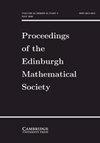Solid bases and functorial constructions for (p-)Banach spaces of analytic functions
IF 0.9
3区 数学
Q2 MATHEMATICS
Proceedings of the Edinburgh Mathematical Society
Pub Date : 2024-09-09
DOI:10.1017/s001309152400035x
引用次数: 0
Abstract
Motivated by new examples of functional Banach spaces over the unit disk, arising as the symbol spaces in the study of random analytic functions, for which the monomials解析函数 (p-)Banach 空间的实体基和函数构造
单位盘上的巴拿赫函数空间是随机解析函数研究中的符号空间,其单项式 $\{z^n}\_{n\geq 0}$ 表现出无条件基的特征,但它们通常甚至不构成一个肖德基,受这些新例子的启发,我们为巴拿赫空间和 p-Banach 空间引入了一个称为实基的概念,并研究了它的性质。除了证明固态基的丰富存在性之外,我们还研究了固态基与无条件基的关系、泰勒多项式的弱星收敛、固态跨度问题以及 c0 扮演的奇特角色。这项工作有以下两个特点:(1) 在这一过程中,我们重新审视了单位盘上解析函数的典型巴拿赫空间所满足的公理,从而得出了 $\mathcal{X}^\mathrm{max}$ (和 $\mathcal{X}^\mathrm{min}$ )的概念,以及一些相关的函数构造,这些都是我们感兴趣的;(2) 坚实基础的主要意义在于不可分离的(p-)巴拿赫空间,例如 BMOA 和布洛赫空间,而不是 VMOA 和小布洛赫空间。
本文章由计算机程序翻译,如有差异,请以英文原文为准。
求助全文
约1分钟内获得全文
求助全文
来源期刊
CiteScore
1.10
自引率
0.00%
发文量
49
审稿时长
6 months
期刊介绍:
The Edinburgh Mathematical Society was founded in 1883 and over the years, has evolved into the principal society for the promotion of mathematics research in Scotland. The Society has published its Proceedings since 1884. This journal contains research papers on topics in a broad range of pure and applied mathematics, together with a number of topical book reviews.

 求助内容:
求助内容: 应助结果提醒方式:
应助结果提醒方式:


